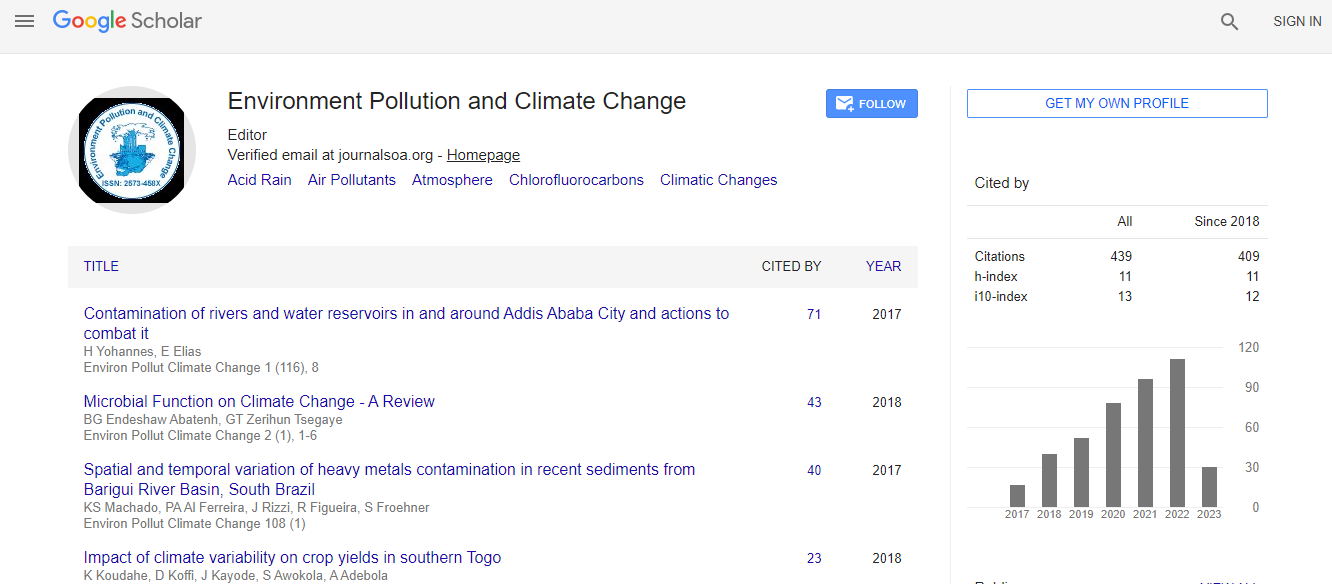Our Group organises 3000+ Global Conferenceseries Events every year across USA, Europe & Asia with support from 1000 more scientific Societies and Publishes 700+ Open Access Journals which contains over 50000 eminent personalities, reputed scientists as editorial board members.
Open Access Journals gaining more Readers and Citations
700 Journals and 15,000,000 Readers Each Journal is getting 25,000+ Readers
Google Scholar citation report
Citations : 672
Environment Pollution and Climate Change received 672 citations as per Google Scholar report
Environment Pollution and Climate Change peer review process verified at publons
Indexed In
- Google Scholar
- Publons
- Euro Pub
- ICMJE
Useful Links
Recommended Journals
Share This Page
Assessing climate-sensitive energy use under the current climate trajectory
Joint Event on 5th World Conference on Climate Change & 16th Annual Meeting on Environmental Toxicology and Biological Systems
Andreas Andreou, John Barrett, Peter Taylor, Paul Brockway and Zia Wadud
University of Leeds, UK
Posters & Accepted Abstracts: Environ Pollut Climate Change
Abstract
Statement of the Problem: Growing concerns about the impacts of climate change have led to increased research to identify the risks borne by energy systems. Energy use in residential and commercial buildings is particularly sensitive to changing climatic conditions; warmer outdoor temperatures are expected to reduce demand for space heating in the winter, while increase that for cooling during summer months. Despite the significant contribution of these end-uses to final energy consumption, future projections do not sufficiently capture the variety of routes through which climate influences sectoral energy demand. The purpose of this research is to study the short-term relationship between energy use and weather, as well as to explore ways through which buildings will respond to different climate trajectories in the long-term. Initially, the project evaluates the impacts of climate change on residential electricity consumption and compares them with those of evolving population, personal income and fuel prices, using the case of United States. Methodology & Theoretical Orientation: The methodological framework is based on an econometric model of monthly electricity consumption (2005-15) which processes variables of climatic and non-climatic nature. Scenario values are then fed into the model to build projections of U.S. residential electricity consumption in the mid-21st century. Findings: On an annual basis, personal income has the largest and most uncertain effect on future (per capita) residential electricity use, followed by electricity prices and, finally, climate change. Monthly results, however, show that climatic impacts become much more significant when examining the variation of peak electricity consumption in the summer. Conclusion & Significance: The results stress the importance of accounting for socio-economic and energy pricing effects in models advising public policy about long-term baseload capacity requirements. Moreover, strategies aiming to downscale power sector’s output should consider the demand for extra reserve capacity to be deployed during the summer. Recent Publications 1. Salari M, Javid RJ (2016) Residential energy demand in the United States: Analysis using static and dynamic approaches. Energy Policy 98:637-649. 2. Fazeli R, Ruth M, Davidsdottir B (2016) Temperature response functions for residential energy demand – A review of models. Urban Climate 15:45-49. 3. Davis LW, Gertler PJ (2015) Contribution of air conditioning adoption to future energy use under global warming. PNAS 112:5962–5967 4. Ciscar J-C, Dowling P (2014) Integrated assessment of climate impacts and adaptation in the energy sector. Energy Economics 46:531-538. 5. Auffhammer M, Mansur ET (2014) Measuring climatic impacts on energy consumption: A review of the empirical literature. Energy Economics 46:522-530Biography
Andreas Andreou is a doctoral student with a major interest in the assessment of climate change impacts on energy systems. With his PhD research revolving around climate-sensitive energy use, he aims to identify stress points in the provision of space heating and cooling services for various climate change scenarios. His work will ultimately provide policy makers with useful tools to construct future adaptation and decarbonisation pathways suitable for regional building sectors. Prior to joining the University of Leeds as a post-graduate researcher, Andreas has completed an MSc degree in the UCL Energy Institute where he explored the various applications of Integrated Assessment Models (IAMs) in the formulation of global climate change policies.
E-mail: eeaan@leeds.ac.uk

 Spanish
Spanish  Chinese
Chinese  Russian
Russian  German
German  French
French  Japanese
Japanese  Portuguese
Portuguese  Hindi
Hindi 
